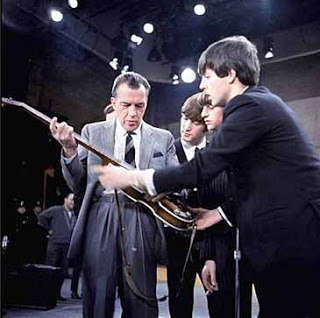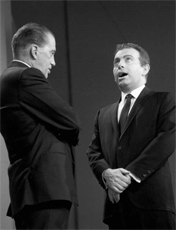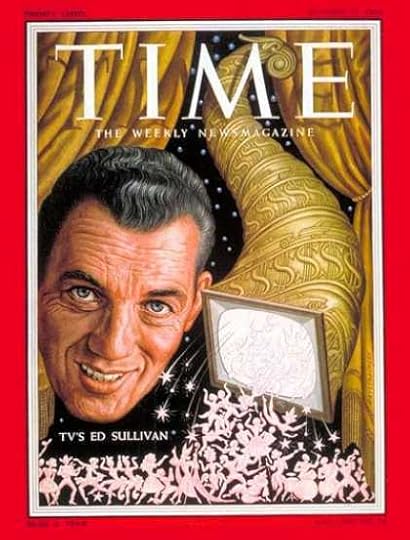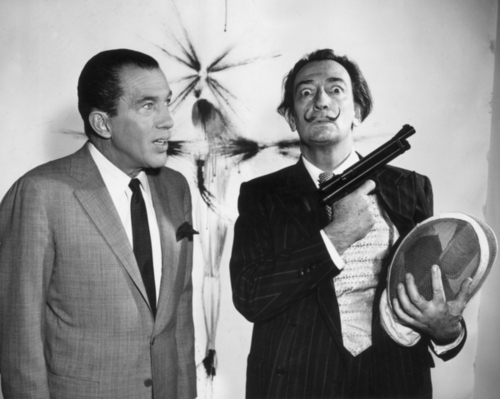Terry Teachout's Blog, page 23
February 7, 2014
Almanac: Alec Guinness on acting technique
Alec Guinness, A Commonplace Book
February 6, 2014
So you want to see a show?
Here's my list of recommended Broadway, off-Broadway, and out-of-town shows, updated weekly. In all cases, I gave these shows favorable reviews (if sometimes qualifiedly so) in The Wall Street Journal when they opened. For more information, click on the title.
BROADWAY:
• A Gentleman's Guide to Love & Murder (musical, PG-13, reviewed here)
• Matilda (musical, G, nearly all performances sold out last week, reviewed here)
• No Man's Land/Waiting for Godot (drama, PG-13, playing in rotating repertory, closes Mar. 30, reviewed here)
• Once (musical, G/PG-13, reviewed here)
• Outside Mullingar (comedy, PG-13, closes Mar. 16, reviewed here)
OFF BROADWAY:
• Avenue Q (musical, R, adult subject matter and one show-stopping scene of puppet-on-puppet sex, reviewed here)
• The Fantasticks (musical, G, suitable for children capable of enjoying a love story, reviewed here)
• Hamlet/Saint Joan (drama, G/PG-13, remounting of off-Broadway production, playing in rotating repertory, closes Mar. 9, original production reviewed here)
CLOSING SOON IN GLENCOE, ILL.:
• Port Authority (drama, PG-13, closes Mar. 2, reviewed here)
CLOSING NEXT WEEK ON BROADWAY:
• Twelfth Night (Shakespeare, G/PG-13, closes Feb. 16, all performances sold out last week, reviewed here)
CLOSING SUNDAY OFF BROADWAY:
• King Lear (Shakespeare, PG-13, reviewed here)
• The Commons of Pensacola (drama, PG-13, reviewed here)
Almanac: Anthony Burgess on literature that moralizes
Anthony Burgess, The Kingdom of the Wicked
February 5, 2014
GOING ON AND ON AND ON ABOUT BARBARA STANWYCK
February 4, 2014
Snapshot: James Baldwin in 1963
(This is the latest in a series of arts-related videos that appear in this space each Monday and Wednesday.)
TT: Snapshot
(This is the latest in a series of arts-related videos that appear in this space each Monday and Wednesday.)
Almanac: James Baldwin on sentimentality
James Baldwin, "Everybody's Protest Novel"
TT: Almanac
James Baldwin, "Everybody's Protest Novel"
Really big shows
 Ed Sullivan is in the news this week, sort of: Sunday marks the fiftieth anniversary of the Beatles' first appearance on The Ed Sullivan Show.
Ed Sullivan is in the news this week, sort of: Sunday marks the fiftieth anniversary of the Beatles' first appearance on The Ed Sullivan Show.
Most people under the age of fifty know nothing about Sullivan or his variety show, which ran on CBS from 1948 to 1971, but in its day it was a program of immense cultural significance. I've written about it on several occasions, most recently in Commentary in 2010:
Countless families ritually watched it together in their living rooms every Sunday night. Though [Elvis] Presley and the Beatles, who appeared in 1964, are Sullivan's best-remembered guests, some 10,000-odd other performers and groups--among them Woody Allen, Louis Armstrong, Tony Bennett, Irving Berlin, George Carlin, Johnny Carson, Johnny Cash, Ray Charles, Noël Coward, Judy Garland, the Muppets, Edith Piaf, Richard Pryor, Barbra Streisand, and the Supremes--were seen on the show during its 23-year-run. In the Fifties and Sixties, to be booked by Sullivan was universally regarded as a sure sign that an up-and-coming performer was well on the way to stardom. "When Ed put his arm around you and pulled you over and said, 'She's a really funny little lady,'" Carol Burnett recalled, "America said, 'She's a really funny little lady.'"
I've long been fascinated by Sullivan's role in the formation of our now-defunct middlebrow common culture, so I thought it might be fun to commemorate the Beatles' American TV debut by offering a statistical snapshot of exactly who played The Ed Sullivan Show. Here are the names of some of Sullivan's best-remembered guests, followed by the number of times they appeared on the show:
Roberta Peters (41)
Alan King (37)
The Muppets (25)
Victor Borge (24)
Pearl Bailey (23) Jackie Mason (20)
Jackie Mason (20)
Louis Armstrong (18)
Tony Bennett (15)
Eartha Kitt (15)
The Supremes (15)
Sophie Tucker (15)
Richard Rodgers (14)
Nat "King" Cole (13)
Peggy Lee (13)
Johnny Mathis (13)
Richard Pryor (13)
Mickey Mantle (12)
Flip Wilson (12)
Jack Benny (11)
Cab Calloway (11)
George Carlin (11)
The Beatles (10)
Duke Ellington (10)
Sammy Davis, Jr. (8)
Ethel Merman (8)
Bob Newhart (8)
Edith Piaf (8)
Edward Villella (8)
Count Basie (7)
Willie Mays (7)
Gwen Verdon (7)
The Harlem Globetrotters (6)
Mahalia Jackson (6)
Buster Keaton (6)
Charles Laughton (6)
Liberace (6)
Birgit Nilsson (6) The Rolling Stones (6)
The Rolling Stones (6)
Joan Sutherland (6)
The Temptations (6)
Fred Astaire (5)
Carol Burnett (5)
Bing Crosby (5)
Mort Sahl (5)
Barbra Streisand (5)
Woody Allen (4)
Margot Fonteyn (4)
Erroll Garner (4)
Lena Horne (4)
Gladys Knight and the Pips (4)
Lauritz Melchior (4)
Itzhak Perlman (4)
Andrés Segovia (4)
Chet Atkins (3)
Richard Burton (3)
Jacques d'Amboise (3)
Buck Owens (3)
Elvis Presley (3)
The Beach Boys (2)
James Brown (2)
Ray Charles (2)
Van Cliburn (2)
George M. Cohan (2)
Noël Coward (2)
Creedence Clearwater Revival (2)
Judy Garland (2)
Buddy Holly and the Crickets (2)
Alfred Lunt and Lynn Fontanne (2)
Rudolf Nureyev (2)
Ezio Pinza (2)
Buddy Rich (2)
Jerome Robbins' Ballets: U.S.A. (2)
Smokey Robinson and the Miracles (2)
Leontyne Price (2)
Sly and the Family Stone (2)
Mel Tormé (2)
Stevie Wonder (2)
Marian Anderson (1)
The Band (1)
Albert Brooks (1)
The Dave Brubeck Quartet (1)
The Byrds (1)
Maria Callas (1)
Johnny Cash (1)
Salvador Dali (1) 
The Doors (1)
Marvin Gaye (1)
John Gielgud (1)
Jefferson Airplane (1)
The Joffrey Ballet (1)
James Earl Jones (1)
Janis Joplin (1)
B.B. King (1)
Babe Ruth (1)
Albert Schweitzer (1)
Ravi Shankar (1)
Beverly Sills (1)
Tennessee Williams (1)
* * *
The opening of The Ed Sullivan Show on February 9, 1964:
Lookback: is playing classical music an intellectual activity?
All of which leads me to ask: is the performance of classical music an intellectual activity? Did the breadth of Glenn Gould's culture make him a better interpreter of Bach? I wonder. I've known a lot of musicians in my time, some of whom were damned smart and some of whom were (ahem) less so, and I rarely noticed any clear-cut relationship between what went into their heads and what came out of their fingers or mouths. (In my more limited experience, the same is true of dancers and painters.) I'm not saying that a stupid person can become a successful musician, but I'm not so sure that having read T.S. Eliot equips you to play Beethoven's Op. 111 well....
Read the whole thing here .
Terry Teachout's Blog
- Terry Teachout's profile
- 45 followers



